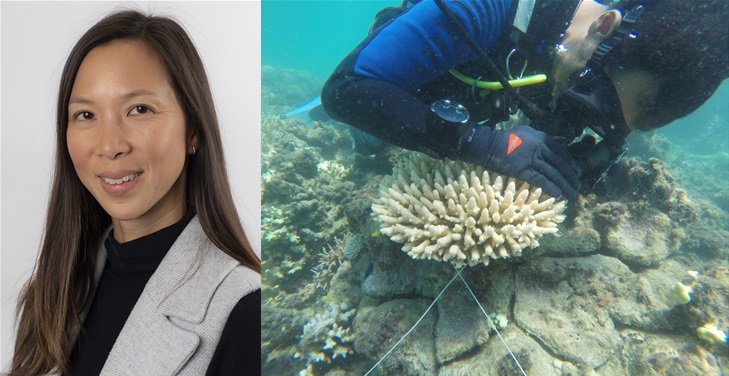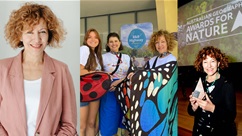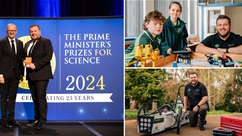KZ: Hi Marian! What experience did you have before your current role?
M: As a young undergraduate student, I took part in as many internship and volunteer positions in marine biology as I could – for example, volunteering at research stations and getting experience with working in the water and driving boats. These volunteer positions really solidified my passion for marine biology and made me want to study it after I graduated. I then spent four years doing my PhD on the Great Barrier Reef before starting post-doctoral fellowship positions at other universities around the world. The flexibility I had in terms of being willing to travel and work overseas meant that I was exposed to a lot of different people, labs, ideas and field sites, which I think has made me a well-rounded scientist as a result.
KZ: What inspired your decision to study marine biology?
M: My experiences snorkeling and SCUBA diving as a teenager, as well as being interested in the local wildlife around me. I grew up in London, UK, so there was not easy access to the ocean as a child, but that never stopped me from being interested in the ocean. Thankfully my parents travelled quite often to and from Malaysia (where they grew up) and so I had experience of going to small tropical islands as a kid and swimming with the fish there. After I graduated with my undergraduate degree in Zoology, it was natural to want to specialise in marine biology for my further studies, which I did in Australia.
KZ: Did you study any subjects or courses, take part in any activities or have any hobbies as a child that helped with your career, or gave you skills that you feel you use a lot at work?
M: At high school, I really loved studying biology as it was just natural for me to think about living things and how they worked. I was also inspired by the wildlife in my back garden when I was growing up, including the birds, squirrels, insects and the fish that my parents kept in ponds. My early experiences with animals probably helped form my interests in animal behaviour thereafter. My parents also took me on many SCUBA diving holidays to places like the Red Sea in Egypt and Malaysia, so I could dive on some of the beautiful coral reefs and further hone my SCUBA diving skills. This helped me feel comfortable in the ocean and also gave me a great fascination for watching fish underwater in their natural environment.
KZ: What are the best and worst parts of your job?
M: The best parts are definitely being in the water watching fish do their thing. I usually get to go on field trips once a year, which isn’t very much, so the rest of the time I’m in the office doing administrative tasks, teaching etc. So to actually be on a tropical island surrounded by corals and fish is a real treat. The worst parts are probably the administration that goes around organising these field trips – there is a lot of paperwork that needs to be organised so that a trip can happen. This can take a lot of time but is always worth it in the end.
KZ: What has been the personal highlight of your career so far?
M: Getting my lecturer job at the University of Wollongong almost 10 years ago! As an academic, it is quite challenging to land your first permanent position at a university, and it requires a lot of persistence to keep applying for jobs all over the world. When I was accepted, I was so excited to be able to come to Australia and finally have a stable position as a marine biologist. It meant that all my hard work had paid off and I could build a research lab and train my own students in marine biology and animal behavior.
KZ: Why is it important to protect biodiversity and our environment?
M: We only have one world, Earth, and the resources on Earth are not infinite. However our population keeps growing day after day, and we are using up resources more quickly than the Earth can renew. This is a huge problem for us in the future, but also all the other animals, plants and organisms that we share the world with and have essentially helped create the world as it currently is. There is a way to behave more sustainably so that future generations of humans and other organisms can survive, but at the moment, we are not progressing in that direction fast enough. Therefore it’s really up to everyone, young or old, to do their bit on a day-to-day basis. You don’t have to be a scientist to protect biodiversity.
KZ: What is your favourite location you have visited in order to study these topics?
M: This is a tough question because each place is unique and very beautiful. Recently though I was on an island on the Great Barrier Reef known as One Tree Island, which is made entirely out of coral rubble (no sand or soil). So it was really special walking around the island because you’re essentially walking on dead coral skeletons. It is also home to nesting seabirds which are not afraid of humans, so you can just walk right up to the birds and watch the parents feed their chicks on the nest. You feel like you’re in the birds’ world rather than the other way round, and I think that’s how we should be living in harmony rather than in conflict with nature.
KZ: What would K-Zoners be surprised to learn about you?
M: In my spare time, I love to sew and this led me to start up a small enterprise where I make bags from upcycled denim and fabrics. I started this in lockdown as a means of helping reduce the amount of textile waste that ends up in landfill and the ocean. And because I love making bags so much, I now have my own website where I sell the bags that I make and help educated people about the environmental damage that fast fashion creates!
Want to read more of our interview with Marian Wong? Grab the August 2022 'Thunderstruck' issue, out now!










Comment Now!